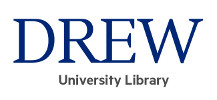 Library Guides
Library Guides Library Guides
Library GuidesPlaces to Look
History is a monograph (book) heavy discipline - you will definately need books to write your paper! Relevant books can be found in a number of places. To start, begin by searching our new Catalog. Those of you used to the old catalog can find it Here. With over 1,000,000 volumes in the University Library, we likely have something that fits your project. If you need still more books, search WorldCat. Containing the combined catalogs of over 72,000 libraries - over 2 Billion individual items in total! - WorldCat is an excellent resource. See a book you like? Order it through InterLibraryLoan (ILL)
Interlibrary loan (ILL) is a service by which Drew students, faculty and staff can submit requests to borrow materials not held by the Drew Libraries. Users can request journal articles, books and book chapters.
Note: Books may take up to 2 weeks to arrive. Articles may arrive more quickly (sometimes the same day!) but please allow at least 5 business days for arrival. Average turnaround time for articles is 2.4 days; for books, 8 days)
Use Worldcat to search for books at other libraries across the U.S. Items that Drew Library owns will appear with a green highlight.

The Library catalog includes our books, special collections, government documents, and many other materials.
Basic Searching
Once you're in the catalog, you can combine terms in the basic Subject Search
Search by keyword, or limit to title, author or subject using the drop down menus.
Search tips:


You can also use advanced search (link in the center of the search box) to find lists titles, author names, subject headings that include, or begin with specific terms:
Searching for subject headings containing women and history:

Searching for titles beginning with Hamlet (note that left to right is checked).
Clicking on the subject, title, etc. that is displayed brings up all the related items.
Boolean Search Terms
AND - Results will contain both words [anywhere, not always next to eachother].
OR - Results will contain at least one word. Example: Britain or "United Kingdom".
Quotation Marks - Search for phrase. A search for "New Jersey" is not the same as a search for New Jersey.
Parentheses - Like in math, it searches here first. Example: Salary and (Teacher or Educator).
Star / Asterisk - Use to capture variations of the same word. Example: Wom* will include "women," "woman," "womens," "womanhood" etc. WARNING: Be mindful that you can get unintended results. "wom*" will also turn up search results for "wombs," "womanizers," and "wombats."
Common Words - Avoid these words. Examples: That, which, the, a, an.
AND NOT - Omits from search. Example: Kings and medieval and not France
NEAR - Will find the two search terms within 16 terms of one another. Example: Medieval and (King near England).
Searching with Boolean
Searching a catalog can be tricky, so we use Boolean Search Logic.
Steps to using Boolean
1) Break your idea into nouns. "What was Thomas Jefferson's views on the French Revolution?"
The three key nouns are 1) Thomas Jefferson 2) views/opinions 3) French Revolution.
2) Rephrase it in boolean. Focus on tangible nouns first. "Thomas Jefferson" and "French Revolution". Start with an "anywhere" keyword search.
3) Narrow search results by adding to the search: "Thomas Jefferson" and "French Revolution" and (opinions or views)
4) Narrow search with Title searches. A book about Jefferson and the French Revolution will probably have those in the title! If you are still getting too many search results, try searching for these (and other) keywords in the "title" option.
5) Once you find a book on your topic, you can find even more using Subject or Term searches. The French Revolution is officially cataloged as "France--History--Revolution, 1789-1799". Knowing this, you can find all our books on the topic. Jefferson also has an official catagory: "Jefferson, Thomas, 1743-1826" If you search for both, you can find all book covering both topics! This works especially well in WorldCat.
The above approach works with WorldCat, our Catalog, and article/database searches!
Questions? Need Help? Email reference@drew.edu
Drew University Library, http://www.drew.edu/library